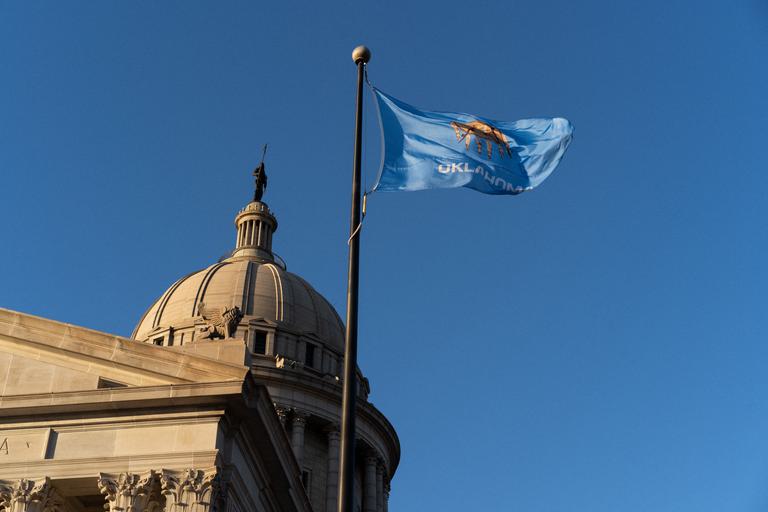
Budget & Tax , Education
Ray Carter | May 25, 2021
Charter-school funding bill goes to governor
Ray Carter
Legislation that could significantly increase funding for brick-and-mortar public charter schools has won easy approval in the Legislature and now awaits Gov. Kevin Stitt’s signature.
Senate Bill 229, by Sen. John Michael Montgomery and Rep. Kyle Hilbert, creates the Redbud School Funding Act and dedicates a share of marijuana tax collections to the State Public Common School Building Equalization Fund. Money in the fund would then be used to provide grants to school districts with little local property tax revenue, allowing those districts the ability to address building needs much more readily.
Hilbert said the legislation brings Oklahoma more in line with national norms.
“We’re one of only four states in the country that doesn’t have some equalization mechanism for school districts that have lower property-tax values within their boundaries,” said Hilbert, R-Depew.
Public charter schools are among the biggest winners from the legislation’s passage because they currently receive no funding from local property tax sources. That has resulted in significant funding disparities.
A national report issued in December 2020 found that per-pupil revenue in the traditional Tulsa Public Schools district was $12,949 per student from all sources in the 2017-18 school year, while Tulsa’s public charter schools received just $7,686 per child, a difference of $5,263, or 41 percent.
Public charter schools have received far less in funding than traditional schools for decades even though charter schools often outperform traditional public schools serving comparable students.
SB 229 would provide nearly $38.5 million in grant funding each year to school districts that have little local property tax other than virtual charter schools, which are carved out of the bill.
While physical charter schools are the most obvious beneficiaries of the legislation, Hilbert said many traditional public schools with limited local property tax collections would also see increased funding, such as Lawton, which would receive $1.8 million every year in new “redbud” funding.
“That is a really, really big deal,” Hilbert said.
He rejected calls to run separate bills addressing charter schools and traditional public schools separately.
“Public-school kids are public-school kids,” Hilbert said. “Brick-and-mortar public-school kids are brick-and-mortar public-school kids and we’re not differentiating.”
He said the legislation, if approved, will effectively negate a lawsuit settlement recently approved by the State Board of Education. An Oklahoma Public Charter School Association lawsuit, originally filed in July 2017, argued that charter schools must be treated like all other public schools when it comes to funding. Under the settlement agreement, charter schools are guaranteed a proportional share of local property tax funding, which could mean a shift from some districts that previously received excess property tax funding.
Rep. Melissa Provenzano, D-Tulsa, noted the bill repealed a provision of law that required charter schools to use funds only for buildings that house students, and suggested that could lead to abuses.
“Hypothetically, we could build or rent a building where no children were present—it was just an administrative building,” Provenzano said. “Is that correct?”
Hilbert said that change duplicates the requirements that exist for traditional public schools.
“That would be the same rule for all public schools, not just for charters,” Hilbert said.
Under current law charter schools are allowed to only accept a certain number of students. When a brick-and-mortar charter school reaches capacity, the school must then hold a lottery to award available seats to incoming classes.
Hilbert said the funding provided through SB 229 could result in those schools expanding or buying new facilities, giving them more space for more students in future years.
“I would think in a lot of these brick-and-mortar charters that are at capacity, this would hopefully help them not be at capacity,” Hilbert said. “Because obviously there’s a desire there for parents to have their kids in those institutions. Otherwise they wouldn’t be at capacity.”
However, he noted that SB 229 does not fully eliminate the funding disparity between public charter schools and traditional charter schools.
“There is still a discrepancy, because while now Santa Fe South (charter school), yes, they’re getting $330 extra per student because of this, Santa Fe South still can’t pass a bond, but Lawton can,” Hilbert said. “There is still that discrepancy that the traditional public schools do still have better funding than charter schools.”
SB 229 passed the Oklahoma House of Representatives on a 97-1 vote. It now proceeds to Gov. Kevin Stitt to be either signed or vetoed.

Ray Carter
Director, Center for Independent Journalism
Ray Carter is the director of OCPA’s Center for Independent Journalism. He has two decades of experience in journalism and communications. He previously served as senior Capitol reporter for The Journal Record, media director for the Oklahoma House of Representatives, and chief editorial writer at The Oklahoman. As a reporter for The Journal Record, Carter received 12 Carl Rogan Awards in four years—including awards for investigative reporting, general news reporting, feature writing, spot news reporting, business reporting, and sports reporting. While at The Oklahoman, he was the recipient of several awards, including first place in the editorial writing category of the Associated Press/Oklahoma News Executives Carl Rogan Memorial News Excellence Competition for an editorial on the history of racism in the Oklahoma legislature.